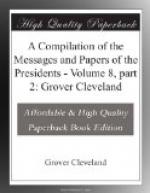The executive government of the United States has no power or authority to determine what was the true line of boundary between Mexico and the United States before the treaty of Guadalupe Hidalgo, nor has it any such power now, since the question has become a question between the State of Texas and the United States. So far as this boundary is doubtful, that doubt can only be removed by some act of Congress, to which the assent of the State of Texas may be necessary, or by some appropriate mode of legal adjudication; but in the meantime, if disturbances or collisions arise or should be threatened, it is absolutely incumbent on the executive government, however painful the duty, to take care that the laws be faithfully maintained; and he can regard only the actual state of things as it existed at the date of the treaty, and is bound to protect all inhabitants who were then established and who now remain north and east of the line of demarcation in the full enjoyment of their liberty and property, according to the provisions of the ninth article of the treaty. In other words, all must be now regarded as New Mexico which was possessed and occupied as New Mexico by citizens of Mexico at the date of the treaty until a definite line of boundary shall be established by competent authority.
This assertion of duty to protect the people of New Mexico from threatened violence, or from seizure to be carried into Texas for trial for alleged offenses against Texan laws, does not at all include any claim of power on the part of the Executive to establish any civil or military government within that Territory. That power belongs exclusively to the legislative department, and Congress is the sole judge of the time and manner of creating or authorizing any such government.
The duty of the Executive extends only to the execution of laws and the maintenance of treaties already in force and the protection of all the people of the United States in the enjoyment of the rights which those treaties and laws guarantee.
It is exceedingly desirable that no occasion should arise for the exercise of the powers thus vested in the President by the Constitution and the laws. With whatever mildness those powers might be executed, or however clear the case of necessity, yet consequences might, nevertheless, follow of which no human sagacity can foresee either the evils or the end.
Having thus laid before Congress the communication of his excellency the governor of Texas and the answer thereto, and having made such observations as I have thought the occasion called for respecting constitutional obligations which may arise in the further progress of things and may devolve on me to be performed, I hope I shall not be regarded as stepping aside from the line of my duty, notwithstanding that I am aware that the subject is now before both Houses, if I express my deep and earnest conviction of the importance of an immediate decision or arrangement or settlement of the question of boundary between Texas and the Territory of New Mexico. All considerations of justice, general expediency, and domestic tranquillity call for this. It seems to be in its character and by position the first, or one of the first, of the questions growing out of the acquisition of California and New Mexico, and now requiring decision.




